- Home
- Steven Ehrman
The Spanish Butler (A Sherlock Holmes Uncovered Tale Book 8) Page 8
The Spanish Butler (A Sherlock Holmes Uncovered Tale Book 8) Read online
Page 8
“There is one last thing I do not understand, Holmes,” said I. “Charles is infirm and Arthur was a vital man. Could Charles have possibly done all you say?”
“Of course, Doctor. This crime was months in the planning. The first part of the plan is to dismiss the servants from the home. This way no one notices that they are gone for several days. The house is remote and they have no social friends. The next part of the plan is for Charles Bloomfield to appear to be quite ill. His wife buys some clothes for him that are too big and he complains of weakness. Remember that the doctor cannot actually find anything wrong with him. Because he protests so vociferously that he hates his illness no one questions it. It was remarkably simple.”
“What have you to say to all this, Mr. Bloomfield?” asked a stern Inspector Hopkins.
“There is nothing to say,” replied the man in a low voice. “It is merely the ravings of an amateur detective.”
“Can you prove any of this, Mr. Holmes?” asked the Inspector.
“Given time, I believe we could piece together a case of circumstantial evidence, but that will not be necessary. There is the eyewitness testimony of the staff that saw the couple for two days. They can testify to the illusion.”
“That means nothing,” cried Charles Bloomfield. “Arthur and I were brothers. Of course we look alike.”
“I was thinking of Dora Bloomfield. She played the part of Berta Bloomfield to the hilt. A red wig and penciled in freckles took care of the main features of the woman. She acted as a typical loud and brassy American woman, at least typical of the caricature of an American woman, but she is not a double for her sister-in-law. The servants can certainly testify to that. It is over, Mr. Bloomfield.”
Charles Bloomfield sat in silence for some moments and then he suddenly flew out of his seat and threw himself upon Holmes. He had his hands around my friend’s throat in an attempt to throttle him when Hopkins and I came to the rescue. Charles Bloomfield’s illness must have been feigned indeed because it took the combined strength of Holmes, Inspector Hopkins, and myself to subdue him.
As the Inspector was handcuffing him, Bloomfield cursed the name of Sherlock Holmes.
CHAPTER TWELVE
By morning the excitement of the previous evening had begun to fade. When I arose, I found that Holmes was already up and he had a guest. I was surprised to see that the visitor was the head of the Baker Street irregulars, Wiggins. The meeting was obviously breaking up as I came into the room.
“You’ve done well, my lad,” said Holmes to the boy. “Off you go now and do not irritate Mrs. Hudson on your way.”
The lad tipped his cap and left the room at a trot.
I might have asked Holmes the reason for Wiggins’s visit, but hunger stayed my hand. I saw that the ever-efficient Mrs. Hudson had already laid out the morning meal. Holmes and I sat together and ate, I with relish and Holmes sparingly. My friend did not speak of the Bloomfield matter, but he did inform me that Inspector Hopkins and Edward Bloomfield were both expected that morning.
At midmorning both men arrived and we all found seats in the sitting room.
“I must congratulate you again, Mr. Holmes,” said Hopkins. “It was a fine bit of work that you performed in this ugly business.”
“I take it that Dora Bloomfield is in custody,” said Holmes.
“She is, sir. She was arrested last night.”
“That is well,” said Holmes. “Though there is no way to know for certain, I feel that she was the impetus behind the murder plot.”
“Why is that, Holmes?” I asked.
“I have looked into the background of both Charles and Dora Bloomfield extensively. While Charles was known as a friendly fellow, his wife had a darker reputation as a brooding, grasping woman. Additionally, there were several deaths of patients in her care during her days as a nurse that appear quite suspicious in light of recent events.”
“If there are other victims, she can only go to the gallows once,” said Hopkins. He glanced over at Edward Bloomfield. “I apologize, Mr. Bloomfield, if I spoke too harshly of your aunt.”
“Think nothing of it,” said the young man airily. “She and uncle are common criminals. I loved my father and I was fond of my step-mother and they killed them without a second thought.”
“And there is the matter of the attempted murder of your wife,” said I. “Thank God that attempt failed.”
“Yes, of course,” said the man.
The mention of his wife’s narrow brush with death seemed to make him wistful in a manner that his father and stepmother did not.
“Dora Bloomfield made a statement last night confessing all, including the attempted murder of Florence Bloomfield,” said Hopkins. “You were right about that, Mr. Holmes.”
“Was she really ill?” I asked.
“I think not, Doctor,” replied Holmes. “She merely pretended in order to avoid coming face-to-face with Florence Bloomfield.”
“Tell me, Holmes,” said I. “When did you begin to suspect Charles and Dora Bloomfield of this mad scheme?”
“I suspected them on that first day when you and I visited them. In fact, I suspected them before we even went inside the house.”
“I saw nothing suspicious outside the house,” said I.
“Whenever I see disorder among order I ask for the reason. The flowerbeds outside the home were meticulously kept, but there were new weeds coming to the surface among the well-tended beds. The obvious answer is that they had gone untended for several days. By this time I was already forming the suspicion of how the entire affair was managed.”
“But surely that was a small item,” said I.
“Of course it was, Watson, but it was a link in a chain. Many clues pointed to the involvement of Charles and Dora Bloomfield. The needle marks spoke of someone familiar with a hypodermic needle. Both horse trainers and nurses employ them. The entire affair needed someone with access to the type of sophisticated make-up that those in the theatre use. The Bloomfields’ deceased son was an actor.”
“Why were you so certain that the victims were carried into the home in the steamer trunks?” asked Hopkins.
“At first it was merely a suspicion, but I returned to the home later. By this time the maid had returned the clothes of the couple to their respective dressers. I took the clothes out again and packed them in the trunks. Or I should say trunk, because they all fit into a single trunk. Why were three trunks used if one would suffice? The answer, of course, is that the other two trunks did not have luggage, but rather the bodies.”
“Still, I am surprised none of the clothing thrown overboard was found,” mused the Inspector.
“But it has been found, Inspector,” said Holmes.
“This is the first I am hearing of it,” returned Hopkins.
“I was informed of the fact only this morning myself,” said Holmes. “As I said yesterday, I would have preferred to build the case a bit more before presenting it, but events forced my hand. As to the clothing, I put my unofficial force, the Baker Street irregulars, on the task. From Albert Dock the currents of any clothing thrown overboard would likely be found in the area of the Plumstead Marshes. I set my irregulars to search that area and I was informed this morning that they had found much expensive clothing there. Some of it was marked with Mr. Bloomfield’s monogram. It would have been another piece of evidence at their trial. Since Dora Bloomfield has confessed it will likely not be needed, but it is pleasant to have my theory confirmed.
“An additional point against the two was confirmed by telegraph this morning from New York. I had made inquiries of associates of the Bloomfields to ascertain if a man calling himself Martinez had ever been in their employ. The reply was there had been no such man employed by the couple as a butler or anything else. That was an additional point in favor of the fact that the real Bloomfields never took possession of their new home.”
“What did that prove?” I asked. “It merely showed that Martinez was not who he claimed to
be.”
“Exactly, Doctor,” said Holmes. “And since that is the case, the real Arthur and Berta Bloomfield would have known that. It meant that all three people were involved in a ruse of some kind. Of course, it turned out that there were really only two people.”
“I still do not see why the whole Martinez business was necessary,” said Edward Bloomfield. “The blasted scheme was already too complicated for my mind.”
“Martinez was critical for many reasons. Several I outlined last night, but another one was the pawning of the ring.”
“You did say that it needed an explanation, Holmes,” I said.
“It told the authorities that Martinez was alive and was a participant in the crime of robbery at least and probably the murders. As I have said, it was cleverly planned.”
“They did not plan on you though, sir,” said Hopkins. Holmes gave an appreciative nod. “I must be leaving now. The Yard has many pressing matters that need my attention.”
With those words, Inspector Hopkins exited the room. Edward Bloomfield was of like mind to leave, but Holmes begged him to remain a few minutes longer.
“I am concerned about your wife’s health,” he said. “I hope that now that your aunt and uncle have been arrested, she is of a more easy mind. What I mean is that they were the only ones to want to cause her harm.”
Yes, I suppose so,” said the man. “She was better this morning. She has been nervy, if that is what you mean.”
“Let me make my meaning a bit more clear,” said Holmes evenly. “Her first relapse was highly unusual. I know something of the effects of arsenic poisoning. If the patient survives the initial dose, the survival rate is high. Now that your aunt and uncle have been locked away, any further relapse could not be blamed upon them. Is that understood?”
The blood had almost completely drained away from Edward Bloomfield’s face as Holmes spoke. He rose from his chair on unsteady legs.
“There will be no relapse,” he said softly.
“I am glad to hear that, but I will keep the lady in my mind,” said Holmes. “I may even call in the future to ascertain that she remains in good health.”
“I am certain that she would enjoy that, Mr. Holmes,” said the young man. “I will pass along your good wishes to the lady. If you gentlemen will excuse me, I will take my leave.”
With a short bow, Edward Bloomfield hurried from the room. As soon as he was gone I turned to Holmes.
“It was impossible to miss your implication, Holmes. Do you mean to say that you believe that Edward Bloomfield made an attempt on his wife’s life?”
“Yes, Doctor. I am afraid that is what I mean.”
“It is monstrous,” I cried. “What could possibly be the motive?”
“Money, of course,” said he. “Charles and Dora Bloomfield told us one thing that was not a lie when we talked to them. Edward Bloomfield did make what some would consider an unfortunate marriage. Florence Bloomfield was certainly in a different social stratum than Edward Bloomfield; moreover she is a divorced woman. In addition, she has a history of drink and she is outside of the Bloomfield’s faith.”
“But I find her perfectly charming, Holmes,” I said in protest.
“As do I, Watson, but the fact remains some thought it a poor match. However, what did Edward Bloomfield care for such thoughts? He was a relatively poor man and she had cared for him in his time of need. It is true he had a rich father, but the father had remarried. It is possible no money will come to the son when his father dies. Then his father and stepmother are killed the same night. The fortune is his, but now the complications of the unfortunate match become clear to him. The glow of affection he felt towards her for nursing him back to health has faded. She must die and her sudden illness is a perfect opportunity to make her go away. He poisons her, not realizing she has been poisoned before. Remember, that it is Florence Bloomfield’s sister that insists the doctor be sent for, not the lady’s husband.”
“Are you certain that putting him on notice was the wise thing to do?”
“I am, Watson. Edward Bloomfield is not a brave man. Knowing that I am watching will be enough to stay his hand in the future. In fact, I predict he will be the most solicitous husband in London from here on out. Do you have any other concerns with my actions in this case?”
“Only one,” I said. “I did not mention it in front of the Inspector because you did not yourself, but what of Seoc Macnab? What was he doing at the Bloomfield residence?”
“Seoc Macnab was never actually at the Bloomfield residence.”
Nonsense,” I said in retort. “I saw him myself, but if you wish to shield him for reasons of your own I will not ask again.”
In irritation I grabbed a newspaper from a table and opened it. The newspaper effectively shielded Holmes from my view. His habit of occasionally withholding information from me was infuriating.
“Doctor, I am Seoc Macnab,” said a voice in a deep Scottish burr.
I threw my newspaper aside and gasped in surprise.
“I am sorry for the deception, Watson. The Seoc Macnab character is a new disguise I had planned to use in a future case.”
“So you decided to see if you could fool your oldest friend? I had hoped we were past these silly games.”
“Again, I apologize, Doctor. I had not meant for you to see me either time I donned the outfit. It was only Mrs. Hudson who was to be my audience. When you happened in on us I could not help but to continue the performance. And when I saw you on Park Lane I was as surprised as yourself, I assure you.”
“But why did you go there in that guise at all?”
“I only wished to see if the staff was particularly observant, and they are not. I varied my accent and knocked my beard askew at one point. It proved to me that the identification of the bodies was spotty at best.”
“Still, you could have told me before this point.”
“Doctor, Florence Bloomfield’s second brush with death greatly disturbed me. That was the event that forced my hand. I feared for the lady. It drove all other concerns from my mind.”
“I suppose I can understand that,” I said grudgingly. “What with you in disguise, the Bloomfield deception, Martinez, and Edward Bloomfield’s behavior, was anyone in this case what they appeared to be?”
“Certainly,” replied Holmes promptly. “You were, Doctor. No one could mistake you as anything other than an upstanding and moral Englishman. You really represent that which is best in us. With you as my moral compass, as well as my Boswell, how could I go astray?”
“Why, thank you, Holmes,” I said. “Shall we have a walk? The weather is fine.”
“Capital idea, Watson. Where else in the world can one walk amongst four million souls.”
We were soon walking arm-in-arm in the streets of the great city. Perhaps our next case was just around the corner.
The End
SPECIAL NOTE
If you’ve read and enjoyed The Sherlock Holmes Uncovered Tales, please add a review at the site on which you purchased your copy. Reviews provide a valuable guide for those attempting to find books they might enjoy.
Thank you,
Steven Ehrman
Table of Contents
DEDICATION
Works by the Same Author
Chapter One
Chapter Two
Chapter Three
Chapter Four
Chapter Five
Chapter Six
Chapter Seven
Chapter Eight
Chapter Nine
Chapter Ten
Chapter Eleven
Chapter Twelve
special note
; -moz-filter: grayscale(100%); -o-filter: grayscale(100%); -ms-filter: grayscale(100%); filter: grayscale(100%); " class="sharethis-inline-share-buttons">share

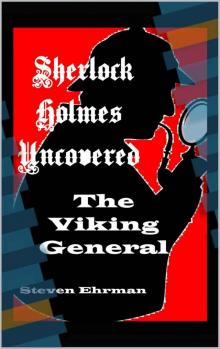 The Viking General (A Sherlock Holmes Uncovered Tale Book 9)
The Viking General (A Sherlock Holmes Uncovered Tale Book 9)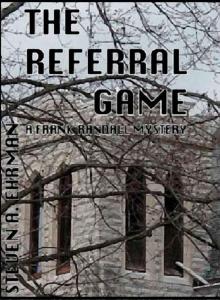 The Referral Game (A Frank Randall Mystery)
The Referral Game (A Frank Randall Mystery) Collection of Four Short Stories
Collection of Four Short Stories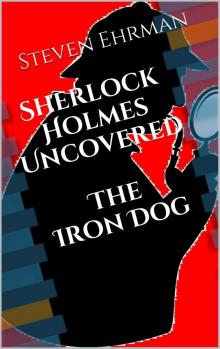 The Iron Dog (A Sherlock Holmes Uncovered Tale)
The Iron Dog (A Sherlock Holmes Uncovered Tale)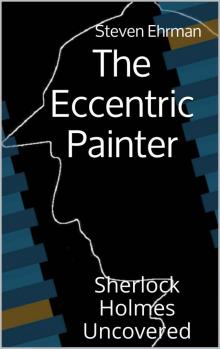 The Eccentric Painter (A Sherlock Holmes Uncovered Tale)
The Eccentric Painter (A Sherlock Holmes Uncovered Tale)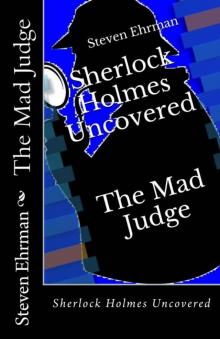 The Mad Judge (A Sherlock Holmes Uncovered Tale Book 3)
The Mad Judge (A Sherlock Holmes Uncovered Tale Book 3)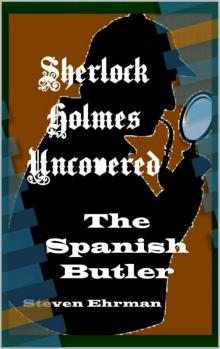 The Spanish Butler (A Sherlock Holmes Uncovered Tale Book 8)
The Spanish Butler (A Sherlock Holmes Uncovered Tale Book 8)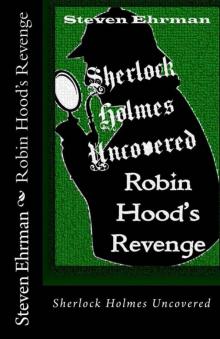 Robin Hood's Revenge (A Sherlock Holmes Uncovered Tale Book 7)
Robin Hood's Revenge (A Sherlock Holmes Uncovered Tale Book 7)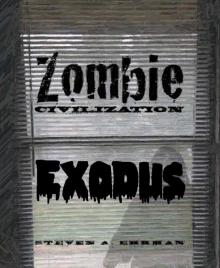 Zombie Civilization: Exodus (Zombie Civilization Saga Book 2)
Zombie Civilization: Exodus (Zombie Civilization Saga Book 2)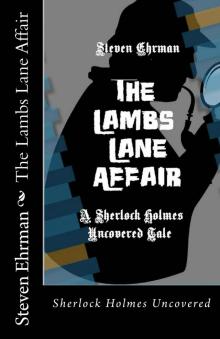 The Lambs Lane Affair (A Sherlock Holmes Uncovered Tale Book 5)
The Lambs Lane Affair (A Sherlock Holmes Uncovered Tale Book 5)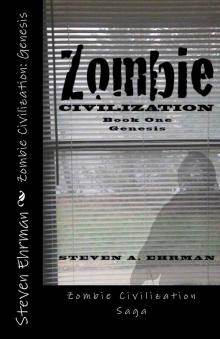 Zombie Civilization: Genesis (Zombie Civilization Saga)
Zombie Civilization: Genesis (Zombie Civilization Saga)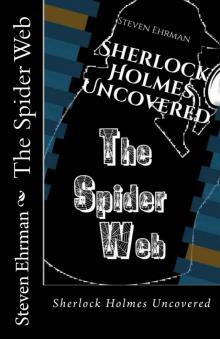 The Spider Web (A Sherlock Holmes Uncovered Tale Book 4)
The Spider Web (A Sherlock Holmes Uncovered Tale Book 4)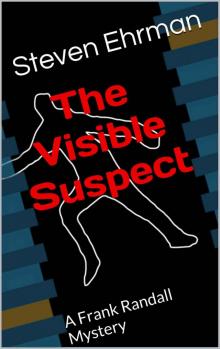 The Visible Suspect (A Frank Randall Mystery)
The Visible Suspect (A Frank Randall Mystery)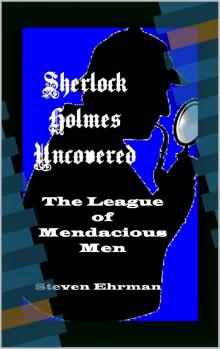 The League of Mendacious Men (A Sherlock Holmes Uncovered Tale Book 10)
The League of Mendacious Men (A Sherlock Holmes Uncovered Tale Book 10)